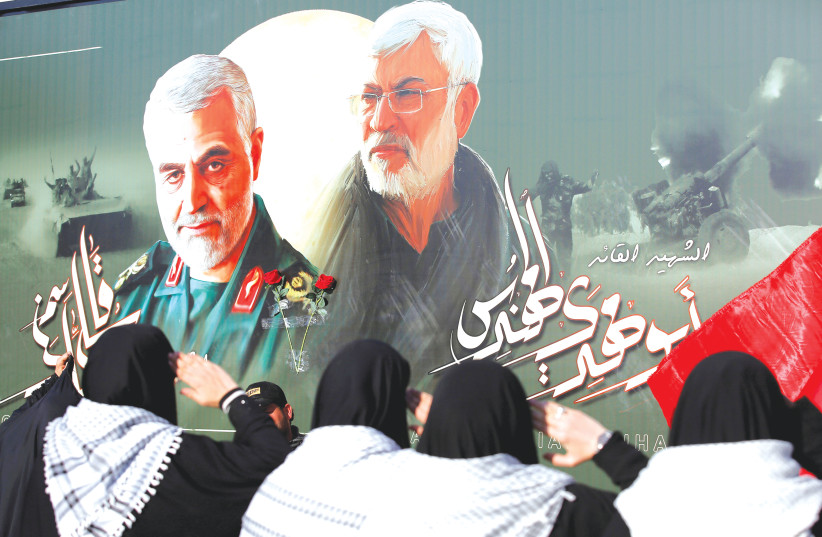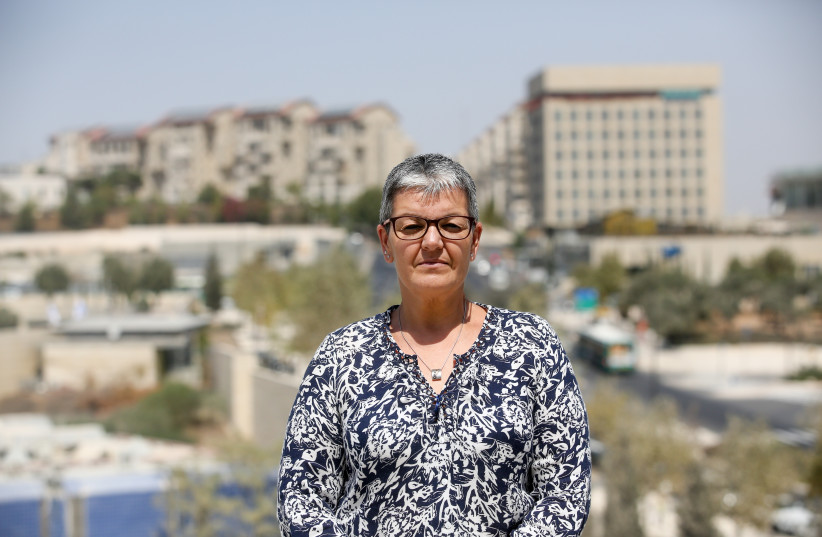It was the end of December. Former IDF intelligence chief Tamir Heyman had just become the first top Israeli official to formally confirm two years of foreign media reports according to which Israel had provided intelligence to the US that aided in the assassination of top Iranian military officer Qasem Soleimani in 2020.
In fact, what Heyman revealed in an outgoing interview with an intelligence center magazine was already known for more than a year by The Jerusalem Post.
But all of this had been kept under lock and key because Israel would not officially confirm it.
Iranian media, NBC and Yahoo had gone into excruciating detail about Israeli intelligence involvement supporting the assassination. Yet, in Israel the news was censored and, knowing that it could not be published, Israeli journalists did what they routinely do – they self-censored.
Heyman’s interview was the turning point.

If the fear was that Iran would attack, once someone in Israel said out loud that the Jewish state had been involved in taking out Soleimani, Heyman had crossed that threshold.
And yet the censor still blocked a Post report revealing additional details of Israel’s involvement, on the basis of Heyman’s revelation, and deleted so many aspects of it that it was decided the story was not worth publishing.
Though frustrating, this was not the first time.
But it did make us think about the following: How could this be happening in a democracy? How could Israel block something from being published for two years, only to see a top IDF officer nonchalantly reveal it to an intelligence center?
It raises additional questions as well – such as how does a censor even exist in Israel in 2022?
The chief military censor today is Brig.-Gen. Doron Ben Barak, who previously served as the deputy military advocate-general and someone who is well acquainted with human rights and civil liberties. People who meet him describe a reasonable and pleasant person.
And yet to journalists, the censor is oftentimes viewed as an adversary. Ben Barak runs an entity that does not exist in other democracies. While in most cases, the censor seems to just slow down and dilute scoops, it is known to occasionally quash them.
On the job since August 2020, Ben Barak has kept a low profile, knowing that his position frequently puts him between a rock and a hard place.
On one hand, he may get yelled at by IDF generals or top Mossad officials for approving media pieces they might have preferred to block. (Interestingly, he gets more pushback from the Mossad than he does from Israel’s other secretive intelligence agency, the Shin Bet.)
On the other hand, he may get an earful from feisty reporters for holding back a report that was already published by media overseas or posted on social media.
So the question remains: Is Ben Barak striking the right balance between democracy and security?
PART OF the difficulty in answering that question is that it breaks down into a variety of sub-questions that are not always related.
The ideal context for the censor to debate the issue would be to compare Israel’s censorship model for preventing the publication of classified information to the ones in the US and UK.
One argument is that criminal law threatens American journalists much more than Israelis (see the Valerie Plame affair as an example).
In other words, the American system basically works according to a “buyer beware” model: there is no formal way to check whether your article violates state security, but if you do break the rules, you could be sent to prison.
“In the UK, there is a different mechanism – DSMA-Notice (Defense and Security Media Advisory Notice). It is an official request to news editors not to publish or broadcast items on specified subjects, for reasons of national security,” explained Ben Barak.
“Any D-notices or DA-notices [Defense Advisory Notices] are only advisory requests and are not legally enforceable; hence, news editors can choose not to abide by them. However, they are generally complied with by the media.
“Yet, if you do not ask for advice or you don’t follow it, you are exposed to legal risk,” he added.

Ben Barak’s view is that Israel is at far more risk due to the nature of threats it faces, and that whenever the US – post 9/11 – or England – during the Falklands War – had a crisis, their governments cracked down hard on media revelations of sensitive security issues.
In any case, Ben Barak believes that most Israeli journalists prefer the current system “because if they follow the censor’s orders they can ‘sleep well.’”
He emphasized that, most of the time, the Military Censor approves the article without any corrections. Ben Barak elaborated, “Israelis have as much or more data about their key security and foreign affairs public debates than in other countries.”
While the rest of the debate would be secondary in importance for Ben Barak, there are issues that arise when comparing Israel to other models that need to be explored.
Firstly, the debate downplays the freedom the Military Censor itself has in deciding what can be published and what cannot. Secondly, it downplays the unfairness to the local media, and possibly to the public, of keeping Israeli media restricted even once stories have been published overseas. Moreover, it does not capture the problems with politicians or IDF officers like Heyman disclosing what was presumed to be classified information – all while blocking the media from reporting on some of these issues in a way that might come out as political liabilities.
Some recent examples include: then-prime minister Benjamin Netanyahu and former Mossad director Yossi Cohen’s leaks about Israeli operations against Iran and Syria, Prime Minister Naftali Bennett’s leak of a Mossad operation to learn more about what happened to Ron Arad, and the above example involving Heyman’s leak about the Soleimani assassination.
CHANGE HAS long been spoken about by censors and academics. In 2015 Brig.-Gen. Sima Vaknin Gill, the censor since 2005, conceded that the censor, as currently set up, was highly problematic and needed a serious makeover.
“Israel is a democratic, liberal and Western state which defends its secrets using draconian measures, and sometimes these [principles] contradict each other,” she said at the time.
Before stepping down, Vaknin Gill submitted a number of suggestions to the government for extensive but gradual changes over time – which it appears were mostly rejected.
After Vaknin Gill, Brig.-Gen. Ariella Ben Avraham was appointed the chief censor. She declined to comment for this article and has largely been silent since stepping down.
One veteran critic of the Military Censor is Israel Democracy Institute expert Tehilla Shwartz Altshuler, who in 2016 called for the censor to be completely abolished.
Shwartz Altshuler argued that the Israeli model should be replaced with a system more similar to what is used in the US, using criminal laws against revealing state secrets to deter reports that should not be publicized.
She said that the problem of the censor “is not new. It has always been political, where the censor lets politicians” leak certain items and “enforcement against them is not equal. This was not only under Benjamin Netanyahu, but also under Ehud Olmert and others before them.
“The censor acts very strongly with enforcement against the news media, but is very weak against politicians,” she stated.
She said that the censor has “always known this and never stopped the ugly model in which politicians can do what the media cannot,” noting it is an antidemocratic idea to let politicians get away with something that regular citizens are prohibited from doing.
Discussing the impact of the digital age on the censor, she said that in some ways the situation today is “worse and in some ways better. We thought the digital world would beat the censor. We were wrong. The censor continues to function and even is able to get content removed from online.”
Regarding social media, Ben Barak’s position is that there are certain types of content he cannot block, such as publicly available satellite photos with incredible resolution of Israel’s nuclear reactor at Dimona – which Israel’s enemies can purchase for $20-$100.
The same goes for Israeli flight radar buffs like Itai Blumenthal and Avi Sharf, who sometimes succeed in using open sources to track secret Israeli flights.
Sometimes social media also helps Ben Barak make his case to generals, such as in an instance last May, when he sent a social media video of a huge fire caused by Hamas rockets during the Gaza war to convince an official there was no point trying to quash reports of the incident.
According to Shwartz Altshuler, the censor is not the only Israeli institution to blame. A huge jump in the number of gag orders requested by the Israel Police starting in 2013 and 2015, when she said that then-police commissioner Roni Alsheich, who came from the Shin Bet, shifted the police to a more opaque position when it came to publicizing its operations to the public.
Basically, according to Shwartz Altshuler, the censor is part of an ecosystem in Israel that cracks down on transparency and accountability.

Noting that Vaknin Gill herself did not make much progress with reforming the censor, Shwartz Altshuler acknowledged, “The chances of reforms happening are very small.”
The censor, it is important to remember, is based on a pre-state British 1945 emergency law which did not evolve much besides some High Court of Justice and Knesset modifications in the ’70s and ’80s.
Ben Barak’s view is that until the advent of CNN covering the Gulf War in 1991, including trying to report where rockets might have landed, the censor’s control was more extensive.
Still, he thinks that the Knesset or government had many chances to “reform” the censor – passing Basic Laws in the 1990s, the 2002 Shin Bet Law and a 2017 executive order about the Mossad – and in each instance there was no reform; and if there were changes, they were minor.
ANOTHER MAJOR issue stems from the censor’s methodology for nixing an item.
The test the censor says it applies to whether to alter or veto an item is whether the publication would “almost certainly substantially harm state security.”
This test gets broken down into five main factors: 1) the purpose of censoring; 2) precedents for the publication; 3) whether censoring is feasible; 4) the source of the report; and 5) the context.
Many of these factors are highly subjective and could lead to different conclusions based on differing broader agendas or even individuals’ personal philosophies.
For example, even if a piece of classified or potentially damaging information has been publicized, the censor may still think it can continue to block its publication to minimize impact.
This is all the more true when it comes to publishing Israeli secrets in the foreign media.
Israeli political officials often choose to leak something to a US, European or Middle Eastern publication like The New York Times, Germany’s Der Spiegel or Kuwait’s Al-Jarida in order to get a message out under the fake headline of “Western” or “Middle Eastern” intelligence sources, while still maintaining plausible deniability.
This routinely puts the Israeli media at a distinct disadvantage to report on matters when it should be taking the lead, and incentivizes portions of the media to be the first and only one to sneak over the line.
Moreover, the question of how damaging the information will be if it initially gets out through only one, two or some other minimal number of publications is about as subjective as you can get.
WITH ISSUES like Israeli attacks on Iran and Syria, once an operation is already done, the main reason to censor the news is to give Israel’s adversary plausible deniability that they were hit by Jerusalem, so they will hopefully choose not to counterattack.
How does the censor know how many publications made known the same fact or whether something publicized in an Israeli publication versus a foreign one will or will not lead to an Iranian counterattack, as an example?
Is the censor counting how many likes or retweets a first article got to decide what Iran will do if a second similar article runs? Should the censor be making such calls without more direct oversight or intervention from the media?
Ben Barak and his staff’s narrative would be that they have veterans working in the office, sometimes for decades. These veterans live and breathe the question of which Israeli reports and reporters can set or change the agenda and, most importantly, could lead to violent responses from Israeli adversaries.
There is no set rule of thumb and certainly not on the record.
But it can be gathered that with certain stories the censor will be ready to “throw in the towel” and allow previously censored material to flow to the public, if it has failed to minimize the impact of an initial isolated report within four or five hours.
Other reports it may decide are impossible to “kill” within a much shorter time. Still other reports it may think can still be walked back weeks or months later, if the stories never got real traction when they first came out.
In other words, the situation is fluid and needs to remain that way to enable maneuverability.
But with all of their accumulated wisdom and dozens of staffers who collate and study trends caused by certain reports, who is to say that their judgment is more right than, for example, a council of chief editors?
Or, what about the possibility of creating a joint council comprised of senior editors and censor officials to decide on what needs to be banned?
Of course, tossing out this last idea of granting a group of key editors greater consultation rights in some ways only highlights the depth of the dilemma. Put bluntly, few if any of the alternative paradigms suggested seem to have a chance of being adopted by the Knesset or the general public.
An INSS survey in October showed 80% support for the censor from the general public.
“Some surveys have shown that the general public even thinks the censor allows too much security information to be publicized,” affirmed Ben Barak, explaining that this is a “byproduct of Israel being far more endangered by a range of its neighbors than other democracies.”
As much as Ben Barak tried to justify his office’s decisions, he can always fall back on a simple proposition: any time the Knesset wants to eliminate or reform the censor, it is free to do so.
The problem with this theory is that politicians, who flout the censor left and right whenever it suits them, are about as likely to give up their platform as the exclusive peddlers of censored information as they are to vote to cut their salaries to help cover budget shortfalls.
This is an uncomfortable point for the censor, but it is also true.
THE TRUTH is that while the censor’s office might disapprove of certain politicians’ revelations, there is nothing it can really do.
Why was it in the national interest for Netanyahu to talk about Israeli airstrikes against Syria during an election campaign after years of staying silent on the subject to avoid blowback?
Why was it OK for former Mossad chief Cohen to essentially take credit for Israeli operations against Iran?
And was it right for Bennett to arbitrarily leak that the Mossad had undertaken an operation to determine the fate of missing IAF navigator Ron Arad?
What was achieved by Bennett’s leak – other than him getting a headline with the words “Bennett” and “Mossad” in the same line?
Such instances of politicians breaking censor rules is where greater input from the media’s own editors could make a difference. They could help size up whether the censor was flexible in letting something be reported or was biased in favor of politicians.
THERE ARE some other pieces to the story of the censor besides security issues.
The censor keeps a tight lid on reports related to the nuclear program in Dimona, especially any references to – as foreign sources claim – nuclear weapons capabilities.
Also, the censor will sometimes block reports about sensitive meetings between top Israeli officials and foreign officials with whom Israel does not yet have diplomatic relations – including foreign reports about meetings between Netanyahu and Saudi Crown Prince Mohammed bin Salman both in Tel Aviv and Saudi Arabia.
There has also been an ongoing petition before the High Court of Justice to force the censor out of the business of vetting disclosures of top-secret records from the national archives decades later.
Ben Barak correctly predicted that the censor would defeat the petition and explained that even if the censor had been unexpectedly forced out, it would just mean that the Defense Ministry would have to step in and delay disclosures even longer.
Ben Barak seems to be trying to be as balanced as possible. He understands the need for the media to be free to report and for the defense establishment to be equipped to prevent harm to Israel’s security. Which is why, despite all of its baggage, it seems the censor is not going anywhere anytime soon. ■
